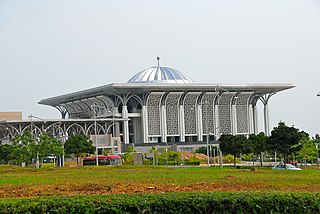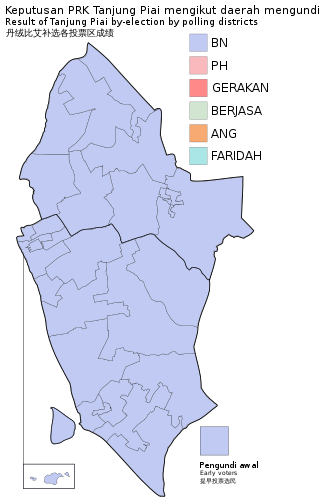Related Research Articles
The National Front, officially Barisan Nasional (BN), is a political coalition of Malaysia that was founded in 1974 as a coalition of centre-right and right-wing political parties to succeed the Alliance Party. It is the third largest political coalition with 30 seats in the Dewan Rakyat after Pakatan Harapan (PH) with 82 seats and Perikatan Nasional (PN) with 74 seats.

Hussein Onn was a Malaysian lawyer and politician who served as the third Prime Minister of Malaysia from the death of his predecessor Abdul Razak Hussein in 1976 to his retirement in 1981. Moreover, he was the Member of Parliament (MP) for Sri Gading from 1974 to 1981, representing Barisan Nasional (BN) and United Malays National Organisation (UMNO). He was granted the soubriquet Father of Unity.

The Malaysian People's Party is a dormant political party in Malaysia. Founded on 11 November 1955 as Partai Ra'ayat, it is one of the older political parties in Malaysia and traces its pedigree to the anti-colonial movements from the pre World War II period like the Kesatuan Melayu Muda.

Shahrir bin Abdul Samad is a Malaysian politician who was the Minister of Domestic Trade and Consumer Affairs (2008-2009), a Member of Parliament of Malaysia and the former chairman of the Barisan Nasional Backbenchers Club (BNBBC). He is a member of the United Malays National Organisation (UMNO), the largest political component party in the former ruling Barisan Nasional (BN) coalition. In Parliament – specifically the lower house of Parliament of Malaysia, the Dewan Rakyat – he represented the constituency of Johor Bahru in the state of Johor for six non-consecutive terms..

BERJASA is a political party in Malaysia. The party is part of a Malay-Islam based coalition named "Gerakan Tanah Air".

Gelang Patah is a bustling town in Iskandar Puteri, Johor Bahru District, Johor, Malaysia. It was administered by ruling coalition, Barisan Nasional (BN) for over 5 decades until the 13th Malaysian General Elections. BN lost to the opposition, Pakatan Harapan in the 14th General Election as well as the 15th.

Mohamed Khaled bin Nordin is a Malaysian politician who has served as the Minister of Defence since December 2023 and previously served as the Minister of Higher Education for the second term from December 2022 to December 2023 in the Unity Government administration under Prime Minister Anwar Ibrahim. He had previously served as Deputy Minister of Works, Minister of Entrepreneur and Co-operatives Development and his first term as Minister of Higher Education in the Barisan Nasional (BN) administration under former Prime Ministers Mahathir Mohamad, Abdullah Ahmad Badawi and Najib Razak from 1999 to 2013. Additionally, he served as the 15th Menteri Besar of Johor after he contested and became a Member of the Johor State Legislative Assembly (MLA) for Permas from May 2013 to May 2018. Throughout his political career, he has been the Member of Parliament (MP) for 3 different Johorean federal constituencies, which are Johor Bahru from October 1990 to March 2004, Pasir Gudang from March 2004 to May 2013 and currently for Kota Tinggi since November 2022. He is a member and the Division Chief of Pasir Gudang of the United Malays National Organisation (UMNO), a component party of the Barisan Nasional (BN) coalition. He has served as a Vice President of UMNO since June 2018 and had also served as the State Chairman of UMNO of Johor from January to December 2023.
Shaziman bin Abu Mansor is a Malaysian politician, a prominent member of the United Malays National Organisation (UMNO), a component party of Barisan Nasional (BN) coalition. He is also the former Works Minister of Malaysia.

The Malaysian Indian Muslim Congress is a political party in Malaysia which seeks to represent the interests of Muslim people of Indian descent in the country.

This article lists important figures and events in Malaysian public affairs during the year 2010, together with the deaths of notable Malaysians. Malaysia Day, 16 September was celebrated as a national holiday for the first time.
Mohamed bin Rahmat was a Malaysian politician, and former Information Minister of Malaysia. He was famously known as Tok Mat, Mat Setia and Mat Mr Propaganda.
Abdul Latiff bin Ahmad is a Malaysian politician who served as Minister in the Prime Minister's Department for Special Functions from 2021 to 2022. He was the Member of Parliament (MP) for Mersing from 1999 to 2022.
General (Rtd) Tan Sri Md Hashim bin Hussein is a Malaysian retired Army officer, diplomat and politician. He served as Chief of the Malaysian Army from 1 January 1999 to 31 December 2002.

Mas Ermieyati binti Samsudin is a Malaysian politician and lawyer who has served as Chairperson of the Public Accounts Committee (PAC) since April 2023 and as the Member of Parliament (MP) for Masjid Tanah since May 2013. She served as Deputy Minister in the Prime Minister's Department in charge of Parliament and Law in the Barisan Nasional (BN) administration under former Prime Minister Ismail Sabri Yaakob and former Minister Wan Junaidi Tuanku Jaafar from August 2021 to the collapse of BN administration in November 2022, Deputy Minister of Entrepreneur Development and Cooperatives in the Perikatan Nasional (PN) administration under former Prime Minister Muhyiddin Yassin and former Minister Wan Junaidi Tuanku Jaafar from March 2020 to the collapse of the PN administration in August 2021 and the Deputy Minister of Tourism and Culture in the BN administration under former Prime Minister Najib Razak and former Minister Mohamed Nazri Abdul Aziz from July 2015 to the collapse of the BN administration in May 2018. She is a member and the Women Chief of the Malaysian United Indigenous Party (BERSATU), a component party of the PN coalition and was a member of United Malays National Organisation (UMNO), a component party of the BN coalition. She has previously served as the 2nd Vice Women Chief of BERSATU from August 2020 to October 2024 and the Women Youth Chief of UMNO from October 2013 to June 2018. After the defeat of BN to the Pakatan Harapan (PH) opposition coalition in the 2018 general election, she resigned from UMNO in 2018 and joined BERSATU in 2019. She is also the second female PAC Chairperson after Noraini Ahmad in Malaysian history.

The 2019 Tanjung Piai by-election was a by-election held on 16 November 2019 for the Dewan Rakyat seat of Tanjung Piai. It was called following the death of incumbent, Md Farid Md Rafik on 21 September 2019.
Syed Husin bin Ali was a Malaysian academic and politician who served as president of the left-wing Parti (Sosialis) Rakyat Malaysia. He was also a prominent political detainee, who was held for six years without trial under Malaysia's Internal Security Act, from 1974 to 1980. Following the merger of Parti Rakyat Malaysia with Parti Keadilan Nasional, he held the position of deputy president of the merged entity Parti Keadilan Rakyat from 2003 to 2010. He also served two terms in Malaysia's Senate from 2009 to 2015.

The 2022 Johor state election, formally the 15th Johor general election, took place on 12 March 2022. The election was to elect 56 members of the 15th Johor State Legislative Assembly. The previous assembly was dissolved on 22 January 2022.
Ali bin Ahmad was a Malaysian politician.
Syed Shahir Syed Mohamud is a former trade unionist and Senator from Malaysia. He led the country’s top umbrella union body, the Malaysian Trades Union Congress, as president from 2005 to 2010. He also served a single term as Senator in the Dewan Negara from 2012 to 2015.
References
- ↑ "Syed Husin remembers #3 – Overcoming 1974 arrests and Ops Lalang". 23 September 2021.
- ↑ "Champion of the downtrodden". Malaysiakini. August 13, 2007.
- ↑ "Politician Abdul Razak Ahmad dies - The Malaysian Bar". www.malaysianbar.org.my.
- ↑ "PKR Johor state chairman Razak dies". The Star.
- ↑ "Abdul Razak Ahmad of PKR dies - The Malaysian Bar". www.malaysianbar.org.my.
- ↑ Poh, Soo K; Tan, Jing Quee; Koh, Kay Yew (2010). The Fajar Generation: The University Socialist Club and the Politics of Postwar Malaya and Singapore. Petaling Jaya: SIRD. ISBN 9789833782864.
- ↑ "How I managed to survive: Syed Husin Ali". The Vibes. January 2, 2021.
- 1 2 3 4 "KEPUTUSAN PILIHAN RAYA UMUM KE-12". semak.spr.gov.my.
- ↑ "Undi.info". undi.info.
- ↑ "Undi.info". undi.info.